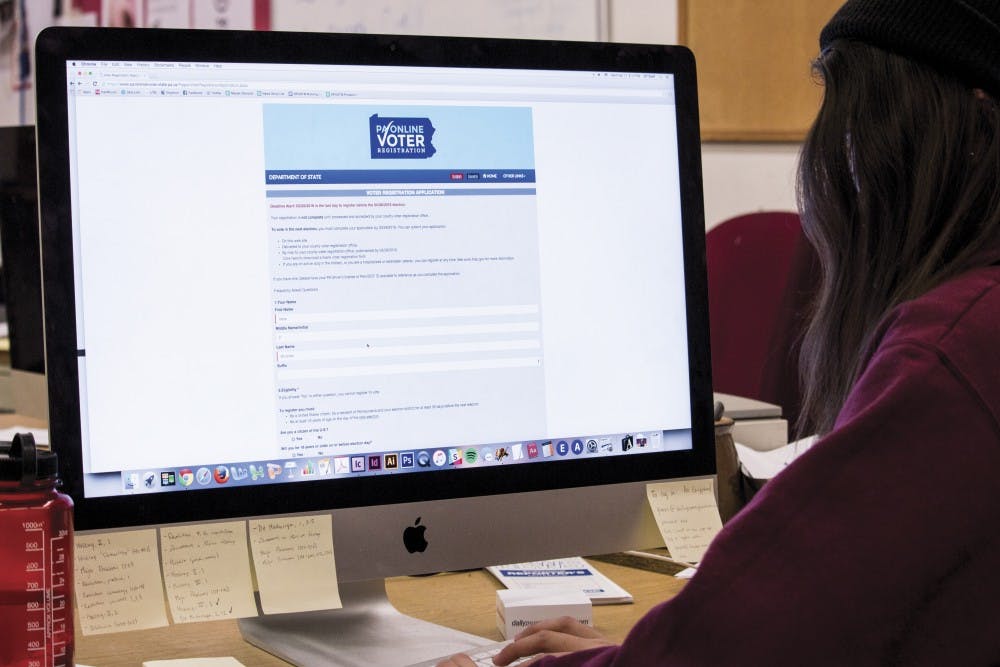
Professor Dan Hopkins' study showed a growing disinterest in local politics, remarking on an increased rise in political distrust among the American people.
Credit: Julio SosaAn old adage may say that “all politics are local,” but interest in politics is clearly not.
According to the U.S. Census Bureau, only 61.8 percent of eligible voters participated in the 2012 presidential election and only 41.9 percent in the 2014 Congressional election. Those numbers have both declined from highs of 64 and 48.9 percent respectively in 1978.
One Penn professor thinks that decline is emblematic of a growing disinterest in local politics.
In his soon-to-be-published book, “The Increasingly United States,” political science associate professor Daniel J. Hopkins says that people are more engaged in national politics and are losing interest on the local level.
“Our identity as American is frequently much, much stronger than our identities as residents of Philadelphia or Baltimore or the state of Pennsylvania,” Hopkins said.
But it hasn’t always been this way.
Hopkins explained that in the 1983 Chicago mayoral election, turnout was higher than in the presidential election of the next year, “which is a really striking demonstration that people really were very, very engaged in that election.”
Declining local participation is ironic, he said, because when the founders originally set up this system of federalism, they created more localized branches to be more democratic. The House of Representatives, for example, was the smallest democratic branch, in contrast with the executive branch, which has one leader and is inherently less democratic.
Hopkins said our nationally focused political participation follows a trend set by modern media. Newspapers and television stations are becoming more nationalized in scope.
It is possible to watch Fox News or read The New York Times “in any corner of this country,” he said.
The main problem, Hopkins said, is not just that voters are more nationally focused, but that there is a “mismatch” between the national focus and the powers held by states and localities in the federal system.
“States and localities make consequential decisions about broad aspects of our lives,” Hopkins noted. “We are engaged in the national spectacle, and missing out on the decisions about who is going to educate our children or how we are going to clean up our streets.”
The United States is currently in a period characterized by high rates of distrust in the federal government and Hopkins believes that as politics becomes more nationalized, distrust will rise. He said that this is because “we are thinking about the level where things [issues] are remote, they are a spectacle of party competition and not the level where the trash actually gets picked up or the police actually serve the neighborhood.”

The irony here is that people also tend to have more trust in their local governments, but participate less, which can continue to hurt them in a self-reinforcing cycle. It is not uncommon to hear criticisms of politicians and government officials, but according to Philadelphia Magazine, only about 27 percent of voters turned out to vote in the most recent mayoral election.
One of the foundations for the Donald Trump presidential campaign is distrust or dislike of politicians. Hopkins believes, however, that this can be a “self-reinforcing cycle where voters think poorly of politicians so they’re not interested in getting engaged in the process.”
“They’re going to start to worry more and more about the narrow constituencies that do vote, and that can just perpetuate the cycle,” he said.
There has been an increased focus and worry concerning the recent decline of political participation on the national spectrum, but Hopkins believes that the problem is more severe locally. In a national election, an individual can make up one of potentially hundreds of millions of voters, whereas in a local election in a smaller city, that same individual can be one of only hundreds or thousands of voters. Their vote, which matters much more proportionally, is going to waste.
The Daily Pennsylvanian is an independent, student-run newspaper. Please consider making a donation to support the coverage that shapes the University. Your generosity ensures a future of strong journalism at Penn.
DonatePlease note All comments are eligible for publication in The Daily Pennsylvanian.




